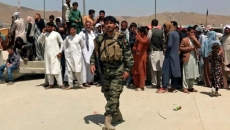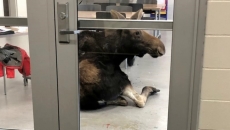Many jurisdictions have extended fourth-dose boosters to their most vulnerable populations as Canada's third-dose COVID-19 vaccine rollout ramps up, leading some to wonder whether we'll all need another shot to protect against the virus in the near future.
Prime Minister Justin Trudeau said Monday that the country will have enough third and fourth doses for all eligible Canadians — if or when they're needed — with contracts signed through 2024 with Pfizer-BioNTech and Moderna.
Dr. Allison McGeer, a microbiologist and infectious disease consultant in Toronto, said Canada isn't at the point where fourth doses are necessary for the general population.
But will we get there somewhere down the road? Perhaps.
"I'm not sure where that point is," she said. "We know with other vaccines that sometimes you need three doses or four doses to get a prolonged, stable effect.
"But really, the answer is we're just going to have to see how protection goes and decide on that basis whether there's value in extra doses."
Canada's National Advisory Committee on Immunization (NACI) has already recommended that moderately or severely immunocompromised people receive a fourth dose at least six months after their third shot.
Many jurisdictions began offering fourth doses to the immunocompromised last month or early this month, including British Columbia, Saskatchewan and Manitoba, while Ontario recently added long-term care home residents to that eligibility list.
Newfoundland and Labrador's chief medical officer of health said Wednesday the province had also begun offering a fourth dose to immunocompromised people.
McGeer said the moves follow evidence that antibody levels tend to wane more quickly in older people, adding that long-term care residents also have the disadvantage of being in high-risk settings for spread.
"As you get older and frailer, you respond less well to vaccines. That's a general truth," McGeer said.
"So in that group of people, in the middle of Omicron, there's a good argument that says giving them a fourth dose to get their levels up to where other people are with a third dose will offer more protection."
Israel is offering fourth doses to health-care workers and anyone older than 60 as the country deals with skyrocketing COVID-19 cases.
Hospitalization rates remain low in Israel, though data shows weekly intensive care admissions have ticked up recently.
McGeer said data from Israel suggests protection may decline in older adults around three to four months after their third dose.
Many provinces in Canada initially allowed people to receive third-dose boosters six months after their second jab, but shortened that timeframe to three months amid Omicron's rapid rise.
McGeer said longer intervals between doses are typically better with most vaccines.
"But ... if there's a lot of (viral) activity, you might be willing to trade off longer duration of protection for a better response now," she said.
"In the face of an Omicron wave ... it seemed better to (go with a) shorter interval."
Another factor complicating a future fourth-dose rollout is the potential that an Omicron-specific vaccine could soon arise.
Pfizer recently said an updated shot could be ready by March, but McGeer said a new vaccine would need to be tested and likely wouldn't be ready for the public until around June.
She added it's still unclear whether a variant-specific jab would be useful.
"We don't necessarily want to give up on protection (against) other variants, since we don't know what the next variant is going to be," McGeer said.
Earl Brown, an immunologist with the University of Ottawa, said developing variant-specific vaccines may be particularly difficult with the COVID-19 virus, which he described as "a moving target."
It's not the same as scientists tweaking the flu vaccine each year.
"If you had made a Delta vaccine, it would have been coming up now and ... you would have missed the target because it's not a Delta story anymore; it's an Omicron story," he said.
"It's pretty tough with moving targets and so far, these variants are coming up sweeping fast."
Dr. Zain Chagla, an infectious disease expert in Hamilton, said a broad fourth dose-push is a misguided strategy, especially if it diverts supply from low-income countries where many people have yet to receive their first or second jabs. He adds that three doses is showing strong protection against severe disease with Omicron.
"We thought we were in the clear giving out two doses ... things were fine (when) we were dealing with Delta and Omicron changed everything in three weeks," he said.
"If we're not caring for those in the rest of world, if we're not stopping this virus from evolving.... It really is going to have serious effects on us."






